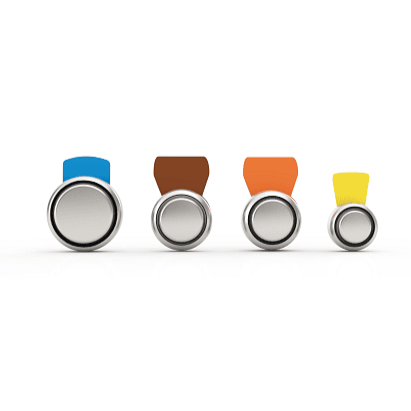Hearing Aid Batteries
Hearing Aid Battery Types
The most common type of hearing aid batteries are the zinc-air battery, which are those tiny disks you also use for watches and other tiny electronic devices. This type of battery cannot be recharged and must be discarded after use.
There are five different sizes of hearing aid batteries. The one that's right for you depends on the shape and size of your hearing aids. Fortunately, the hearing aid industry has color-coded and numbered the battery packaging to make replacing them simpler. The adhesive sticker on the back of the battery is also color-coded.
These conventional zinc-air batteries are widely available in drugstores and electronics stores. They also don't need to be charged at night and are less expensive than rechargeable hearing aids in the short term.

Battery Sizes:
Brown (#312): Since this is the smallest battery, it's best for invisible-in-the-canal and completely-in-the-canal hearing aids. They have a 175-hour battery life.
Yellow (#10): This is another option for the types of hearing aids mentioned above, but they only last 80 hours.
Orange (#13): This is the one you need for larger In-the-ear and Behind-the-ear devices. They have a 240-hour battery life.
Blue (#675): This battery has the highest capacity and can run for up to 300 hours. However, it can only be used with larger hearing aids, such as Behind-the-ear hearing aids.
Extend the life of Your Disposable Batteries
Reduce Moisture
At night, open the battery door and leave it open overnight. Any moisture or condensation will evaporate, extending the life of your battery.

Reduce Heat & Humidity
Turn Them Off at Night
Rechargeable Hearing Aid Advantages
Hearing aid technology is progressing. Instead of using disposable batteries that need to be replaced every day, rechargeable hearing aids are becoming more common.
This is a hearing aid with a built-in battery. All you have to do is charge your hearing aids overnight in a charger, and you'll have a full day's worth of power in the morning. You can also charge your devices in under 30 minutes with some quick charging options.
More Convenient
Better for the Environment
For Those with Less Dexterity
All Day Power
Lithium-ion rechargeable batteries can keep up with all of today's latest technology's power demands while still keeping enough charge for an entire day of hearing.
There are no other charges: Rechargeable hearing aids have no additional costs. The batteries usually last for many years, if not the entire life of the hearing aid.
